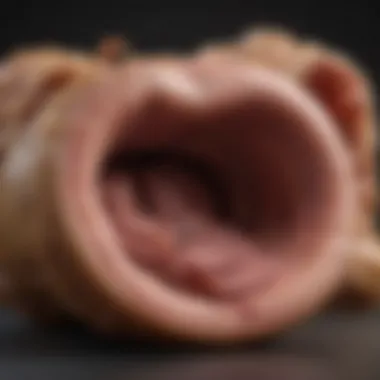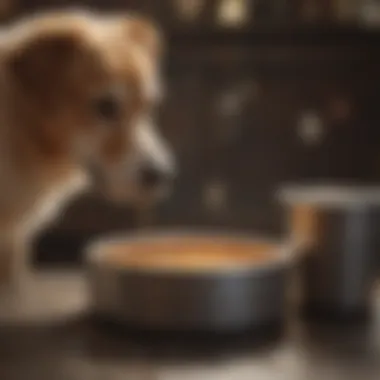Understanding Canine Diarrhea: Feeding Tips & Care


Intro
Canine diarrhea is a common yet concerning issue for many pet owners. It can arise from various causes, affecting dogs of all breeds and ages. Understanding the reasons behind it is essential, especially relating to whether to feed a dog experiencing this condition. This article will address critical aspects of canine diarrhea. It will explore the underlying causes, the risks associated with withholding food, and guidelines for dietary management. Ultimately, the goal is to equip pet owners with the knowledge needed to make informed decisions about their dog's health and nutrition during episodes of diarrhea.
Understanding Your Pet
Understanding your dog's specific needs is crucial in managing health issues like diarrhea. Different breeds have unique traits that may impact their digestive health.
Breed Traits
Some breeds are more prone to gastrointestinal problems. For example, small breeds often experience higher stress levels, which can lead to digestive disturbances. Larger breeds, on the other hand, might have different dietary needs that affect their overall health. It’s important to recognize these traits as they can influence how a dog responds to diarrhea.
Common Temperaments
A dog's temperament can also play a role. Stressful situations may trigger diarrhea. Dogs that are more anxious might exhibit gastrointestinal upset more frequently. Recognizing these behaviors allows owners to better manage their dogs during health incidents.
Special Needs
Additionally, dogs with special needs require careful monitoring. Dogs with prior health issues, sensitivities to certain foods, or those that are elderly may need tailored care. Understanding these aspects ensures owners provide the best care possible during a health crisis.
Pet Care Essentials
Proper care routines become essential when dealing with canine diarrhea.
Nutrition and Feeding Guidelines
When a dog has diarrhea, nutrition is critical. Generally, when a dog is experiencing mild diarrhea without other serious symptoms, a temporary withholding of food for 12-24 hours can be beneficial. This allows the digestive system to rest. After that, gradually reintroducing a bland diet, such as boiled chicken and rice, can help facilitate recovery. Avoid fatty or rich foods, as these may exacerbate the condition.
Grooming Tips and Techniques
Maintaining a clean environment is crucial. Regular grooming helps reduce the buildup of bacteria and ensures that any messes are promptly addressed. This can limit potential complications from diarrhea.
Health and Wellness
Routine veterinary visits are worthwhile. Keeping updated on vaccinations and other health checks helps to prevent conditions that may lead to diarrhea. Vaccines protect against some diseases that can directly lead to digestive issues.
Training and Behavior
Owner awareness of training and behavioral aspects can assist in managing diarrhea episodes effectively.
Basic Training Techniques
Basic commands can help ease situations where stress contributes to diarrhea. Teaching commands like
Prelims to Canine Diarrhea
Diarrhea in dogs is more than just a mere inconvenience; it's a sign of underlying issues that can affect a dog's health. Understanding the nature of canine diarrhea is crucial for pet owners, as it can guide them in responding effectively. The complexity of this condition involves various factors such as nutrition, infectious diseases, and chronic illnesses. By exploring these topics, pet owners can make informed decisions that support their dog's recovery and well-being.
Defining Diarrhea in Dogs
Diarrhea is characterized by an increase in the frequency, volume, or fluidity of bowel movements. For dogs, this often translates to loose, watery stools, which can sometimes lead to urgency or accidents. Any change in bowel habits warrants attention, as it may indicate a range of health issues. Recognizing these signs early can be pivotal in addressing underlying health problems promptly.
Common Causes of Diarrhea
The causes of diarrhea in dogs can be categorized into three main groups, each contributing uniquely to the condition. These categories help in understanding the underlying factors and in deciding on appropriate management strategies.
Dietary Indiscretion
Dietary indiscretion occurs when dogs consume something they should not have, such as spoiled food or table scraps. This is a common factor contributing to barking stomachs and urgent runs outside. The key characteristic of this cause is that it often leads to an acute episode of diarrhea after ingestion of the offending substance. It is a beneficial topic for this article because it is frequent and often preventable. The unique feature of dietary indiscretion lies in the fact that it is largely connected to pet owner behavior. With proper feeding routines and avoiding risky treats, pet owners can easily mitigate this risk.


Infectious Agents
Infectious agents such as bacteria, viruses, and parasites play a significant role in canine diarrhea. Pathogens like Salmonella and parvovirus can trigger severe gastrointestinal disturbances. The key aspect of this cause is that it may involve contagion, making it particularly concerning in social environments like parks or shelters. Understanding infectious agents is vital for this article as it highlights the need for proper hygiene and vaccination practices. The unique feature here is the urgency of veterinary intervention, as untreated infections can lead to more serious health conditions.
Chronic Health Conditions
Chronic health conditions, including food allergies, pancreatic issues, or gastrointestinal diseases, can cause persistent diarrhea. These conditions differ significantly from acute episodes, often requiring thorough examination and long-term dietary management. The key factor that makes this area important is the potential for severe health implications. Chronic health issues also underline the importance of regular veterinary check-ups to pre-emptively identify problems. The unique challenge they present in managing canine diarrhea lies in the need for tailored dietary strategies that cater to the dog’s specific health needs.
Understanding the varying causes of diarrhea aids in determining the right course of action, ensuring your canine companion receives the necessary care and dietary adjustments.
When Your Dog Has Diarrhea
Diarrhea in dogs is a common concern for pet owners. Understanding the right course of action when this occurs is crucial. It can affect various aspects of your dog's health, so addressing it promptly is essential. This section focuses on the immediate responses you should take, as well as how to assess your dog's condition.
Immediate Actions to Take
When your dog experiences diarrhea, the initial actions can determine how quickly they recover. Start by evaluating the severity of the situation. Ensure your dog has access to fresh water to prevent dehydration. Diarrhea can lead to rapid fluid loss. Monitor their drinking habits closely.
Another important step is to refrain from feeding your dog immediately after diarrhea begins. Giving their digestive system a rest can sometimes aid recovery. After a period, consider introducing a bland diet, such as boiled chicken or plain rice, in small amounts. This helps transition them back to solid foods without overloading their system.
Assessing Your Dog's Condition
Understanding the frequency and severity of your dog's diarrhea is vital for assessing their overall health and deciding on further actions. Here are some details to consider.
Frequency and Severity of Diarrhea
The frequency of your dog's bowel movements provides insight into their condition. For example, one or two instances of diarrhea may be manageable and could be due to dietary indiscretion. However, if your dog shows a consistent pattern of diarrhea or if you notice blood in their stool, this indicates a more serious issue.
Severity can also be categorized. Mild diarrhea might show only slight changes in stool consistency. In contrast, severe diarrhea often results in watery stools that occur multiple times within a short span. This frequent illness leads to concerns about dehydration and other health risks.
Assessing these factors is beneficial. You can communicate this information to your veterinarian for accurate advice. It allows for a clearer understanding of your dog’s condition as it helps in judging whether at-home care is enough or if professional help is needed.
Accompanying Symptoms
In addition to the diarrhea itself, watch for accompanying symptoms. These may include vomiting, lethargy, or changes in appetite. Each of these signs can reveal additional health issues. If your dog shows vomiting alongside diarrhea, this likely indicates irritation in the digestive system, warranting a veterinarian's evaluation.
Furthermore, a decrease in energy or interest in food could point to dehydration or another underlying condition. Recognizing these symptoms is crucial for determining the appropriate level of care for your dog. It also provides your vet with essential information, aiding in diagnosis.
In summary, understanding when your dog experiences diarrhea entails immediate actions and thorough assessment. Monitoring frequency, severity, and accompanying symptoms guides further steps. This comprehensive approach ensures that you are well-informed and prepared to help your dog during this uncomfortable time.
Should You Feed a Dog with Diarrhea?
Deciding whether to feed a dog with diarrhea is an important topic for dog owners. This decision greatly impacts the animal's recovery and overall health. Feeding during this time can ensure that the dog receives essential nutrients while also helping to maintain its hydration levels. However, it also introduces a set of considerations that pet owners must take into account, including the type of food and the dog's current condition.
Understanding Nutritional Needs During Illness
During episodes of diarrhea, dogs may experience a loss of essential nutrients. As a result, maintaining proper nutrition becomes critical. It is important to understand that a dog’s nutritional needs do not stop when it has diarrhea. Instead, they may require a diet that is easier to digest.
Light, bland foods are generally recommended. Some suitable options could include boiled chicken, plain rice, and low-fat cottage cheese. These foods provide energy while being gentler on the digestive system. Additionally, incorporating small, frequent meals instead of larger ones can help reduce the stress on the gastrointestinal tract. It is also essential to keep your dog hydrated. Water intake is crucial as diarrhea can result in dehydration. Fresh water should always be accessible. You may also consider offering an electrolyte solution designed for pets.
Potential Risks of Withholding Food
Withholding food from a dog suffering from diarrhea may seem like a prudent choice, but it carries risks that are often underestimated. First, extended periods without food can lead to weakened immune function. This can hinder the dog’s ability to recover from illness effectively. Moreover, withholding food can exacerbate the digestive upset.
If a dog is not fed during these times, it can become even more sensitive to dietary changes when food is eventually reintroduced. This can lead to further gastrointestinal disturbances. The body requires energy to heal, and nutrients are vital for restoring normal gut function.
Key Point: Always prioritize hydration and opt for bland, easily digestible foods to support your dog's recovery.
Dietary Recommendations


Dietary recommendations are crucial for managing canine diarrhea. This section focuses on specifying the right foods to aid recovery and understanding what can worsen the condition. A well-structured diet can play a significant role in calming a distressed gastrointestinal system and ensuring your dog regains health faster.
What to Feed a Dog with Diarrhea
Feeding your dog correctly during diarrhea can make a notable difference. Keeping the diet simple and easy to digest is essential for recovery.
Simple, Digestible Foods
Simple, digestible foods are the first line of defense when a dog experiences diarrhea. They help in soothing the gastrointestinal tract and minimize irritation. Foods such as boiled chicken, plain white rice, or pumpkin puree are often recommended due to their effortless digestibility and low fat content.
The key characteristic of these foods is their gentle nature on the digestive system. They provide the necessary nutrients without adding additional strain on a dog's stomach. For example, plain white rice absorbs excess water and binds the stool, which is beneficial.
The unique feature of simple, digestible foods is their high digestibility rate, which ensures that the dog can easily absorb nutrients. However, these should only be a short-term solution, and as the dog's health improves, a gradual reintroduction of regular food should take place to prevent further digestive issues.
Hydration Importance
Hydration plays a pivotal role in recovery from diarrhea. Pets can quickly become dehydrated due to fluid loss. Therefore, ensuring your dog has access to fresh water is critical. In some cases, electrolytes can be added to the water with the guidance of a veterinarian to support hydration.
The fundamental aspect of hydration is that it replenishes lost fluids. Without proper hydration, your dog could experience further complications, such as kidney problems. Offering ice cubes in the water can also encourage drinking, providing a fun way for your dog to stay hydrated.
The unique feature of maintaining hydration is that it directly affects the recovery process. It helps in flushing out toxins and keeping bodily functions stable. Always observe your dog for signs of dehydration, such as dry gums or lethargy.
Foods to Avoid
When a dog has diarrhea, it’s important to know what not to feed them. Foods that are greasy, high in fat, or dairy products can aggravate symptoms and prolong recovery. Examples include:
- Spicy foods
- Rich treats or table scraps
- Any unapproved human food that can cause digestive upset
Avoidance of these items is crucial to prevent irritation and ensure your dog's gut can heal properly.
Monitoring Recovery
Monitoring your dog's recovery after experiencing diarrhea is essential for several reasons. First, observing changes in your pet's condition allows you to determine whether the issue is resolving or worsening. Decisions made during the recovery phase can significantly impact your dog's health, particularly regarding diet. Understanding how to interpret signs of improvement can guide pet owners in adjusting feeding strategies.
Keeping a close watch on your dog's behavior also informs you about hydration levels and overall well-being. Providing the right nutrition at the proper time is crucial for restoring your dog's digestive health. It helps to ensure that they regain lost nutrients and energy as quickly as possible. Intervening when necessary can prevent complications that might arise from prolonged diarrhea.
Signs of Improvement
Recognizing signs of improvement is the first indicator of recovery. Here are some important signs to look out for:
- Reduction in Frequency: If your dog's diarrhea starts to decrease in frequency, it is a good sign.
- Texture Changes: Transitioning from liquid stools to firmer ones indicates recovery.
- Increased Appetite: A returned interest in food suggests that your dog is feeling better.
- Behavioral Changes: An increase in energy levels or playfulness reflects a positive change in their condition.
Monitoring these signs helps to draw conclusions about your dog's health status. If your dog exhibits consistent improvement over a period of 24 to 48 hours, it may be feasible to start reintroducing normal feeding. However, if symptoms persist or worsen, veterinary assistance may be needed.
When to Reintroduce Regular Diet
Reintroducing your dog's regular diet should be approached with caution. A gradual process is necessary to avoid overwhelming their recovering digestive system. Here are steps to follow:
- Begin with Bland Foods: Start with easily digestible foods such as boiled chicken and rice. This helps to ease the transition.
- Monitor Reactions: After offering these foods, observe for any recurrence of diarrhea or digestive upset.
- Gradually Normalize Diet: If your dog tolerates bland foods well, slowly incorporate their usual diet over several days. This should be done steadily, ensuring no adverse reactions occur.
- Consider Portion Sizes: Smaller, more frequent meals may benefit your dog's digestive tract as it adapts back to normal food.
Important Note: If there are no signs of improvement or if your dog continues to show symptoms after reintroducing food, seeking veterinary advice is imperative. Proper diagnosis and treatment are crucial to ensure your dog returns to good health.
Remember, each dog is unique, and the recovery timeline can vary significantly. Consistency in monitoring is key to a successful return to normalcy.
When to Seek Veterinary Help
Recognizing when to consult a veterinarian during episodes of canine diarrhea is fundamental for the well-being of your dog. Diarrhea can lead to dehydration and other serious health issues, making it crucial to monitor the severity and persistence of the symptoms. In cases that exceed the usual mild diarrhea, seeking veterinary assistance ensures that your dog receives the appropriate care and treatment.
Identifying Severe Cases


Not all cases of diarrhea are equal. It is essential to identify certain factors that may indicate a more serious problem. Severe cases of diarrhea often present with the following symptoms:
- Excessive frequency of bowel movements
- Presence of blood or mucus in feces
- Signs of lethargy or weakness
- Persistent vomiting
- Dehydration, noted by dry gums or loss of skin elasticity
Observing these signs is crucial. If your dog shows any of these symptoms, it is wise to contact your veterinarian. Early intervention can prevent more significant health issues down the line. The sooner you act, the better the chances are for a swift recovery.
"Prompt veterinary attention can often make all the difference in a dog's health during gastrointestinal distress."
Diagnostic Procedures and Treatments
When you take your dog to the vet for diarrhea, they may conduct several diagnostic procedures. Understanding these can help you be well-prepared for the visit. Common diagnostics include:
- Physical Examination: The vet will check your dog for signs of dehydration and other physical symptoms.
- Fecal Tests: A sample may be analyzed to identify parasites or infectious agents responsible for the diarrhea.
- Blood Tests: These help identify any underlying health conditions.
- X-rays or Ultrasound: Imaging tests may be required to visualize the abdominal organs.
Based on the findings, the veterinarian will recommend appropriate treatments. Treatments may include:
- Rehydration solutions for dehydration
- Medications to address underlying causes or ease symptoms
- Special diets tailored to your dog’s specific needs during recovery
Seeking veterinary help allows for tailored care. This ensures your dog receives both immediate relief from symptoms and a comprehensive treatment plan for ongoing health.
Preventive Measures
Preventing canine diarrhea is crucial for maintaining your dog's health and well-being. This section outlines key elements that can help pet owners reduce the risk of diarrhea in their dogs. Implementing preventive measures is not only beneficial in keeping dogs healthy but also promotes overall good habits in dog care. Pet owners who take the time to understand these measures can make informed decisions that impact their pet's long-term health.
Maintaining a Balanced Diet
Feeding your dog a balanced diet plays a significant role in preventing diarrhea. A diet rich in essential nutrients helps maintain optimal digestive health. Ingredients should include high-quality proteins, complex carbohydrates, and healthy fats. Avoid offering table scraps, as these can lead to dietary indiscretion, a common cause of diarrhea.
Additionally, transitioning to new foods should be done gradually to avoid upset stomachs. Over time, pet owners should observe their dog’s reactions to different foods. This ongoing monitoring helps in tailoring the diet according to the dog’s individual needs and preferences.
Preventing Exposure to Risks
To further reduce the likelihood of diarrhea, pet owners must consider various risks. Being vigilant about these risks is an essential part of canine care.
Proper Hygiene Practices
Proper hygiene practices are essential in preventing diarrhea. Keeping feeding areas clean can minimize the exposure to harmful bacteria. Wash food and water bowls regularly and ensure your dog has access to clean water at all times. This simple act can severely reduce the chances of gastrointestinal infections.
A unique feature of proper hygiene is the promotion of a safe environment. By avoiding contamination, pet owners can ensure their dogs stay healthy. Regular cleaning not only protects against diarrhea but also shows dedication to the pet's overall welfare.
Routine Health Check-ups
Routine health check-ups play an important role in maintaining your dog's health. Regular visits to the veterinarian allow for early detection of potential health issues that may lead to diarrhea.
The key characteristic of routine health check-ups is preventive care. These visits enable the vet to perform necessary vaccinations and screenings for parasites. They can also provide useful information about diet, exercise, and general well-being. The unique feature of these check-ups is the ability to tailor health plans according to the individual dog’s needs, which can prevent issues before they arise.
Regular veterinary check-ups are a proactive approach to your dog’s health. Widely acknowledged as a beneficial practice, they foster a deeper understanding of your dog's dietary and health needs, ultimately reducing the risk of diarrhea.
The End
In this article, we have explored a critical aspect of dog health: the management of diarrhea. Understanding how to approach feeding considerations is essential for pet owners facing this issue. Diarrhea in dogs can cause distress and inconvenience, but informed decisions can help mitigate its effects.
Summary of Key Points
Throughout the content, we emphasized several vital themes:
- Nutritional Balance: Maintaining a proper diet is key when your dog is experiencing diarrhea. Choosing simple, digestible foods ensures that your dog receives essential nutrients without straining its digestive system.
- Hydration Importance: Diarrhea can lead to dehydration. Ensuring ample access to fresh water is critical in maintaining hydration during this period.
- Identifying Symptoms: Recognizing when to seek veterinary help can make a significant difference. Symptoms such as severe diarrhea, blood in stools, or prolonged illness should prompt immediate consultation with a veterinarian.
- Preventive Measures: Adopting practices that prevent gastrointestinal upset can help reduce occurrences of diarrhea, including maintaining a balanced diet, practicing good hygiene, and scheduling routine veterinary check-ups.
Together, these points underscore the necessity of being proactive and attentive in managing your dog's health during episodes of diarrhea.
Final Thoughts on Care
In the end, caring for a dog experiencing diarrhea involves much more than just dietary adjustments. It requires awareness, understanding, and the ability to react appropriately to changing conditions. By remaining observant and responsive, pet owners can significantly improve their dog’s comfort and health during such troubling times.
Taking charge of your dog’s care is both a responsibility and a privilege. In doing so, you not only alleviate distress but also promote recovery and well-being. Knowledge and awareness are your best tools in this journey. Remember to consider both immediate needs and long-term health outcomes for a comprehensive approach to your canine's welfare.



